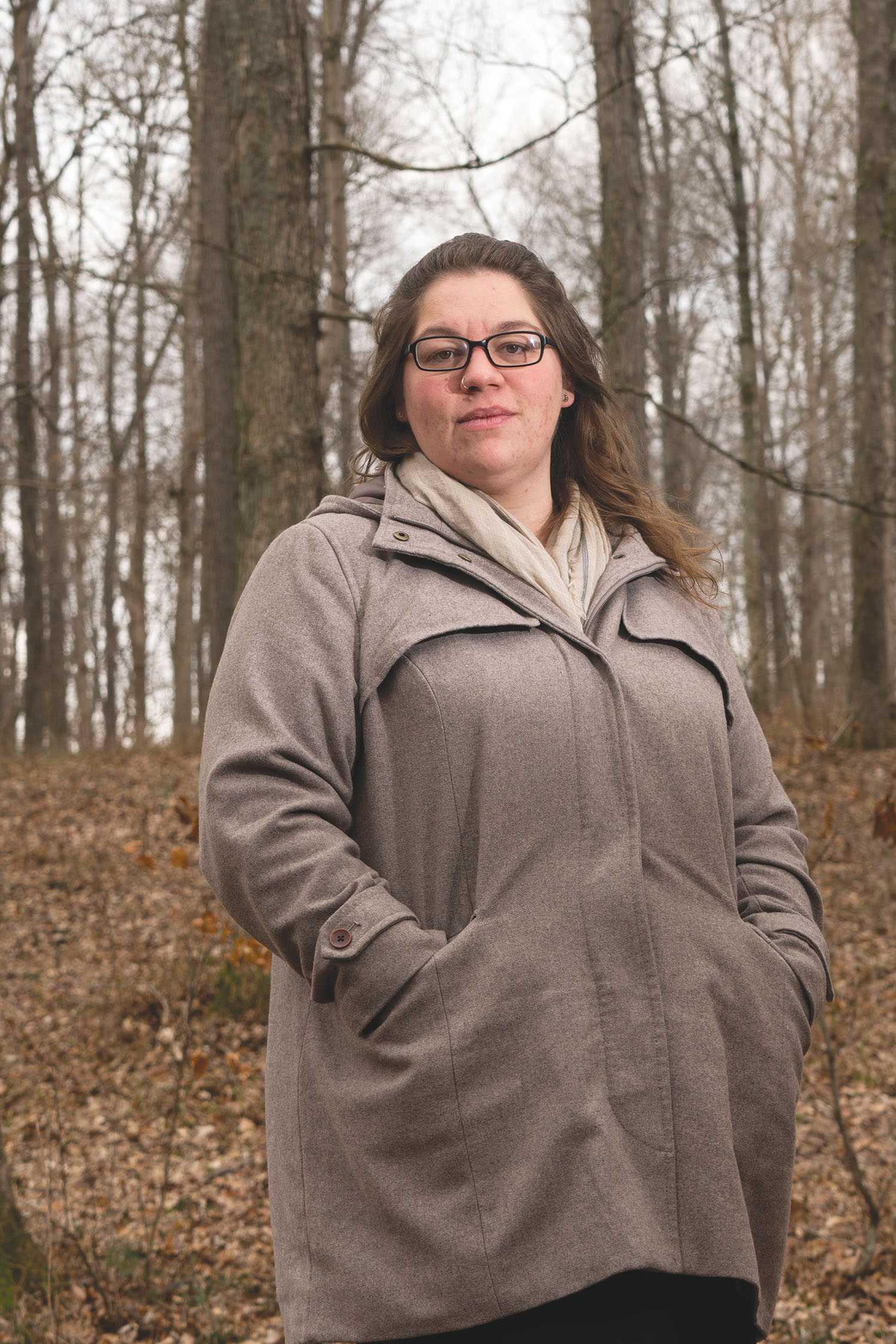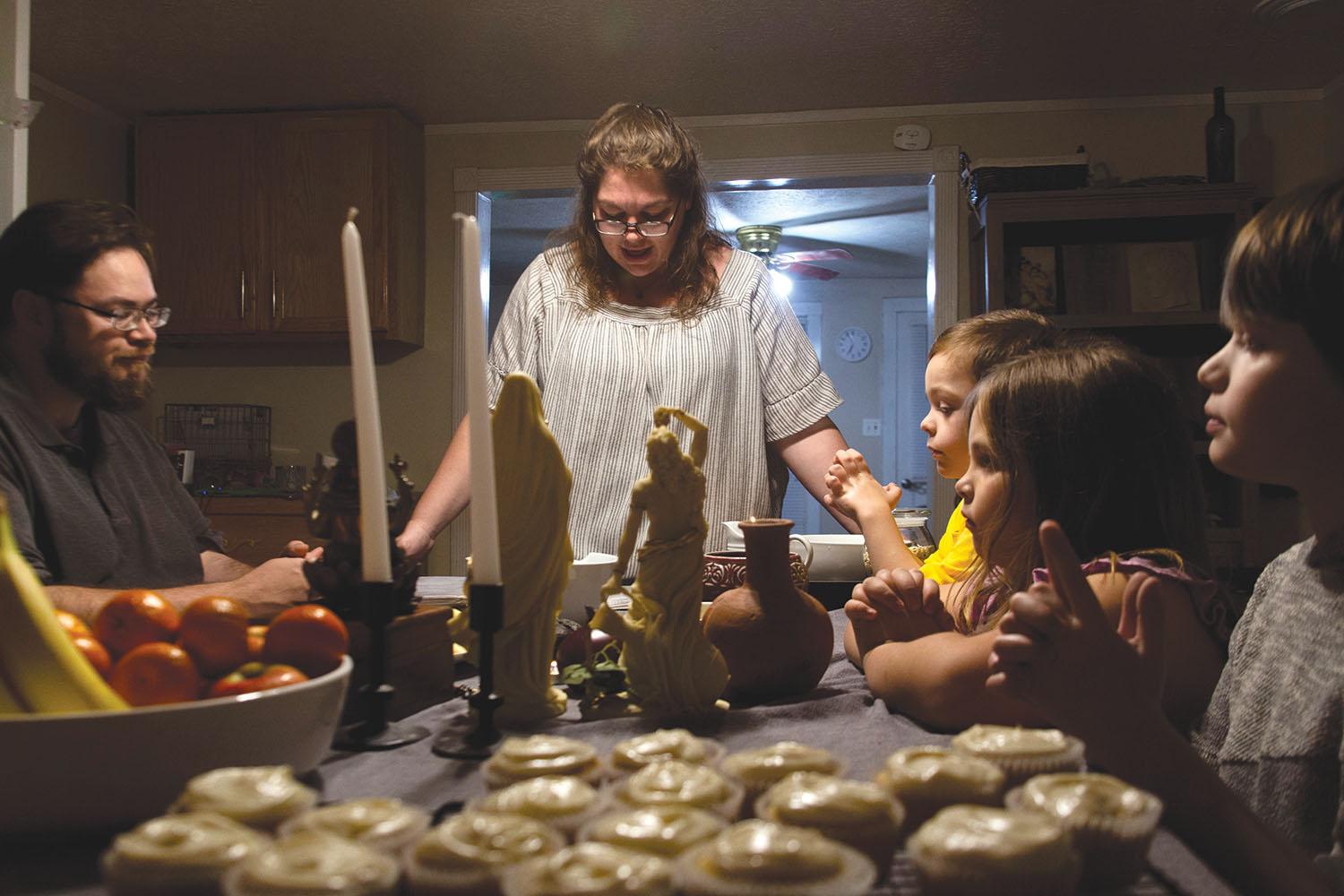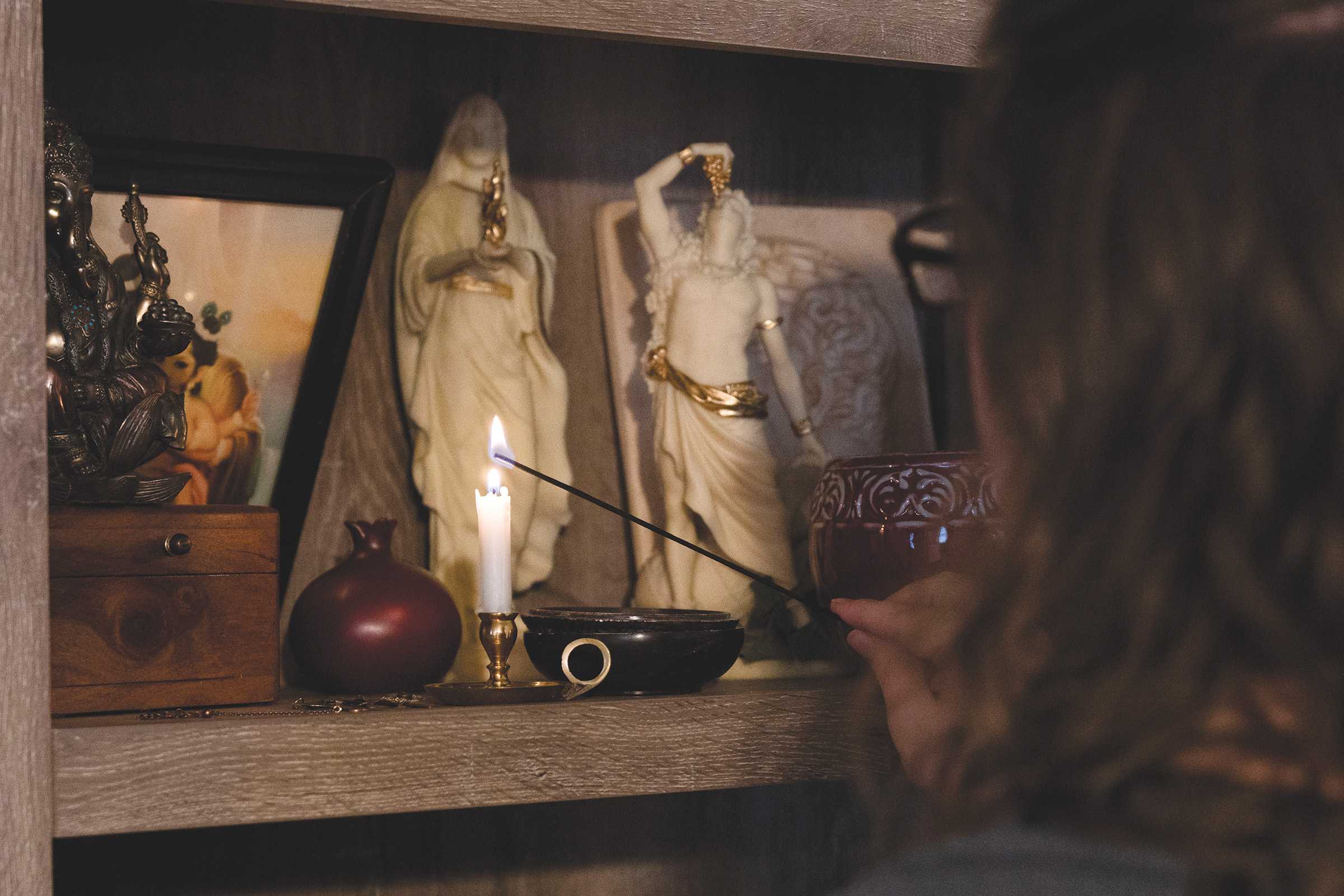This story was originally published in early May in “Paradise,” the sixth issue of Talisman magazine.
Samantha Williams has a tattoo of a grapevine that wraps around her right ankle. Now 32, she got the tattoo when she was 20, and she said it has two meanings. The first is connected to a memory from when she was about 6. Her great-grandmother had a big arch where grapevines grew. She always wanted the grapes from the top of the arch, so her great-grandmother picked them for her. The tattoo’s other meaning is to illustrate her connection to Dionysos, the Greek god of wine, and she considers the memory of her great-grandmother’s grapevines as her first connection to him.
Samantha, a Morgantown senior, identifies as a Pagan polytheist, more specifically a Dionysian. She incorporates Hellenistic and Hindu gods into her personal pantheon, and her shrine is ever-changing because sometimes certain gods appeal to her at certain times. In early February, Dionysos — sometimes spelled Dionysus — and Hestia, Hermes, Hecate, Ganesha and Persephone were on her shrine. Each was represented by small statues, photos, pottery and other items, which she sets up on a brown wooden bookshelf. Before she identified as a Pagan polytheist, she practiced Wicca, a Pagan religion that involves the belief in the divinity of nature, when she was 12. Between the ages of 13 and 17, she was eclectic Pagan, a form of Paganism that blends practices of various Pagan religions.
“I kind of explored, trying to figure out what kind of fit me, what was good for me,” she said.
When Samantha was 12, her friend Josh showed her a website called Spells and Magic. He loaded the site and the screen flashed different colors. The website was full of advice, like how to turn your ex into a toad. Samantha said she brushed the website off, but it mentioned Wicca, which piqued her interest.
“Once I started reading about what Wicca was and got interested in the structure of it all, the connection to nature and things like that, that really spoke to me,” she said.
Samantha said she has always been interested in nature. She grew up on a 300-acre farm in Morgantown, so she was always in the woods as a child, and nature felt like home.

She said she believes Wicca also appealed to her because the idea of casting spells made her feel like she had some control over her life. However, she didn’t think about the magical side of Wicca much. After about a year, she couldn’t shake off the doubt she had about the existence of magic, so she drifted away from Wicca and adopted eclectic Paganism.
At 17, she heard the name Dionysos in a movie. She recognized the name but couldn’t remember who he was, so she looked him up online, where she found a group called Thiasos Dionysos that worshiped him. He was her introduction into polytheism, and she created her first shrine for Dionysos in 2004. It was a nightstand displaying a framed photo of Dionysos, a tea light and an incense holder.
Samantha said not many of the Greek gods appealed to her because they seemed too human to her, but Dionysos seemed to have the ties to nature that appealed to her.
“He has, like, that wild nature about him,” she said.
Part of what appeals to Samantha is that Dionysos represents change, freedom and a rejection of stagnation, she said. Because she rarely drinks alcohol, Samantha doesn’t relate to certain aspects of what Dionysos is often associated with, like intoxication and partying. Nonetheless, he is her patron god.
“It’s kind of like meeting someone and you don’t have a lot in common, but you click,” she said.
Her worship of other gods tends to come and go, she said. Sometimes she just doesn’t feel a connection to them, and sometimes she does. At one point, she tried experimenting with saying prayers and leaving offerings for Hera, the Greek goddess of marriage and birth. She said she thought she would connect with her because she is a wife and mother herself, but she didn’t feel the sense of connection she feels with Dionysos.
“Dionysos is the god of my heart,” she said.
•••
Samantha’s family wasn’t very religious when she was growing up. She went to some Methodist and Baptist churches with grandparents and friends when she was young, but her mother and stepfather didn’t go to church or talk about religion much.
According to the Pew Research Center, about 70.6 percent of adults in the U.S. identify as Christian, and that number is higher, 76 percent, in Kentucky. Two percent of adults in Kentucky identify with non-Christian faiths, with less than one percent of those identifying as Pagan or Wiccan, and 22 percent are unaffiliated with religion.
Samantha said she tried to be a Christian when she was 11 or 12 years old, around the same time she discovered Wicca, not because Christianity spoke to her but because she wanted the connection other people around her seemed to feel. She was jealous of the “church family” her friends had and wanted a similar community, but she didn’t feel a connection to the Christian God.
“I tried reading the Bible,” she said. “I tried praying, and it was just nothing on the other end of the line. I didn’t feel like anyone was hearing me when I was praying, and I was really sad about it.”
Samantha said she doesn’t believe in an afterlife. She said it might seem strange that she devotes so much time to her practice if she doesn’t believe in an afterlife.
“I feel like an afterlife is beside the point because to me, religion has to do with how you live,” she said. “Because if religion is your interpretation of the world, then the world is what matters. And I’m OK with the idea that there’s no afterlife.”
She has also noticed a lot of Christians find comfort in the idea that God has a plan for them, which makes her uncomfortable, she said. Pagan polytheism allows her to pave her own path.
“Ultimately, you are the one who is the driving force in your own life,” she said.
•••
When Samantha was in middle school, she and her friends passed notes that she took home and put in a box. One day when she came home, she found the box open and the notes all over the floor. Her mother had discovered them.
Some of the notes were about Wicca, so her mother asked her about a Wiccan festival mentioned in one of the notes. She told her mother she was Wiccan, and her mother laughed.
“What do you mean you’re a Wiccan?” she remembers her mother asking.
When Samantha tried to explain, she said her mother seemed uncomfortable with it. Her mother later researched it and thought Wicca was devil worship. Samantha’s mother, Kim Howard, said she was upset about Wicca at first because she didn’t understand what it was, and she remembers being more concerned about who was influencing Samantha’s views than she was about the actual practice.
“I was basically just more worried about who her influences were, whether it was something that she had come up with or whether it was something someone else was influencing her on,” she said.
Though Samantha said her mother disapproved of Wicca, her mother knew where to find her in Barnes and Noble — the New Age section — and her mother never stopped her when she looked at books. Because Kim Howard said she doesn’t consider herself a religious person, she didn’t feel like she should stop Samantha from adopting her own beliefs, and she feels the same way now.
“I don’t know what I believe in myself, so how can I tell her what to believe in?” she said.
Samantha said she secretly stole some of her mother’s candles and herbs for her Wiccan altar as a child. She remembers a time her mother was going to clean her room, so she stuffed the items from her altar in an old backpack and rushed them out to the woods to hide them so her mother wouldn’t take them away.
“Like stuff that I had gotten at Goodwill — nothing special — but it felt special to me, and I felt like I had to protect it,” Samantha said.
Samantha said she still tries to keep aspects of her practice hidden from most of her family and from neighbors.
Before she moved from an apartment in Bowling Green back to Morgantown, her hometown, in summer 2018, she left offerings of food at the end of the sidewalk by a flower bush at night for a ritual performed on the last day of the lunar month. Her family and neighbors asked about the food, and she didn’t know how to answer their questions.
“If I say that it has a religious purpose, then I’m afraid they’re going to get uncomfortable, so I dodge the question,” she said.
At her current house in Morgantown, she performs the ritual by a tree at the end of her driveway, and neighbors still ask about her offerings. She still avoids the question and changes the subject.
•••
Samantha keeps a candle by her bed for her daily devotions and says a short prayer every morning and night. On Sundays, she recites a hymn and makes offerings of wine, water and milk to different deities.
When she gives offerings to the gods, she always burns candles and incense, but her other offerings vary. She often offers decorations for her shrine, hymns, works of art, poems she has written, flowers and anything else she believes represents something about her and how she feels toward the gods. She said her worship has an expressive side to it.
“As a matter of fact, maybe that’s how I would define prayer — it’s very similar to a journal entry,” she said. “It’s more about the expression than it is actually wanting your god to give you something. It’s more about feeling like there’s a safe place to express those things that are in you.”
She said she performs most of her practices alone but celebrates some of them with her husband, Jon, and their three children, ages 5, 7 and 9. This includes festivals like Anthesteria, a three-day Athenian festival in honor of Dionysos that takes place in mid-February. She also celebrates other Athenian and Hindu festivals.
“That, I think, is the closest thing to having a church family, is having my actual family,” she said.

Jon practices Ásatrú, which means he worships a Nordic pantheon of gods, but he said he is not as active in his faith as Samantha is and doesn’t perform many rituals. However, he participates in several of Samantha’s practices.
Like Dionysos, Samantha enjoys change, Jon said. The couple balances each other out because Jon said he tends to be laid-back and “fairly stagnant,” unlike Samantha.
“She’s always introducing change and trying new changes with us, the family, and she really keeps us on our toes and keeps us going and active,” he said.
The fact that her shrine is ever-changing reflects her exploratory attitude, he said.
“I think it all goes together very coherently,” he said.
Samantha’s younger brother, Taylor Howard, described Samantha as forward-thinking and said she has she always been true to what she believes. This, he said, played a role in him becoming more comfortable with his sexuality. Taylor said he identifies as gay, and growing up, he and Samantha watched “RuPaul’s Drag Race” and “The Rocky Horror Picture Show” together.
“It’s always been something there and accessible to me, and she showed it in a light that it wasn’t wrong or bad — that it’s OK to be who you are,” he said. “She’s always done that.”
He said because Samantha made him feel more comfortable about who he was, she was the first person he came out to.
When it comes to raising her children, Samantha said she tries to explain to them that everyone sees the world in a different way, and she said they are welcome to participate in her worship, but it’s not something she wants to impose on them.
Though Samantha and Jon and their children don’t celebrate Christmas, Samantha said she didn’t want to take the spirit of Christmas away from her children, so they celebrate winter solstice together. Her children don’t believe in Santa, but they still unwrap presents on the day of winter solstice, Dec. 21, and celebrate the sunrise together.
•••
Throughout her life, Samantha has tried to establish a sense of community. In middle school, she became friends with a group who felt like they didn’t quite fit with anyone else. They called themselves “the Amoeba,” a name Samantha got from a book called “Blood and Chocolate.” They’ve stuck together ever since, and they kept the name.
One of those friends, Casey Phelps, said that even when they were children, Samantha was always researching anything she found interesting.
“Sam always had her own way of finding things she liked,” Phelps said. “When she gets into something, she’s all into it.”
In middle school, Phelps said Samantha became interested in Egyptian history and lore, and their group of friends formed an Egyptian club.
“That was the first of, like, a thousand clubs,” Samantha said.
In an effort to establish a sense of community when it came to her religious practices, Samantha joined the website Pagan Forum when she was in high school, and she stayed active on the site until she had her first child. Samantha said she formed several persisting friendships with people from around the country through the site.
Samantha and her husband gave organized religion a try when they joined the Unitarian Universalist Church of Bowling Green a couple years ago, but they found it wasn’t the right fit.
“It was close, but not quite,” she said. “I feel like that’s the story of my life as a Pagan trying to find a community — close but not quite.”
She said her practice is a bit isolating. Though she’s part of an online group in which worshiping Dionysos is part of everyone’s practice, most of its members live on the west coast, and geographically she doesn’t know of another Dionysian for hundreds of miles.
Samantha said her hobbies, how she views the world and what she wants to do with her life tend to change frequently, but being a Dionysian is one thing she doesn’t think will ever change.
“That’s the only thing that I feel is going to be constant for the rest of my life because it’s so a part of who I am,” she said.



